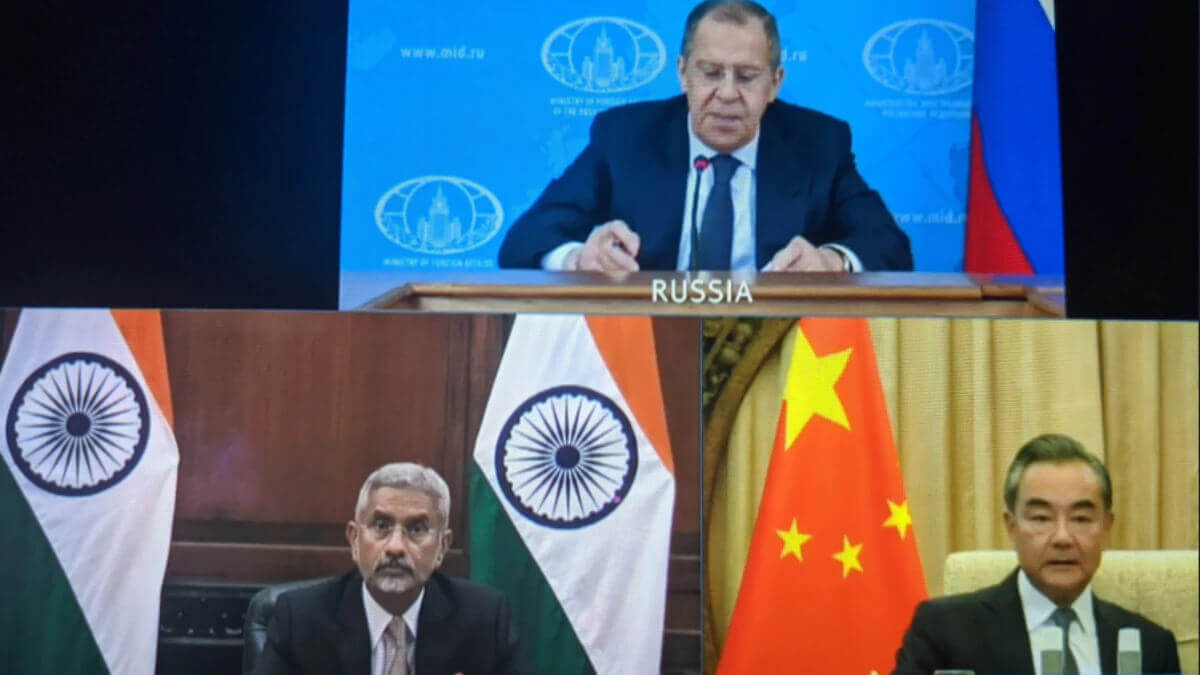The foreign ministers of Russia, India, and China met virtually on Tuesday for the trilateral Russia-India-China (RIC) meet. The opening remarks of the leaders were televised live, following which they moved in for closed-door discussions.
The meeting, which was held to commemorate 75th anniversary of the creation of the United Nations and the victory over Nazism in the Second World War, was also held in the midst of heightened tensions between New Delhi and Beijing as their troops engage in deadly standoffs at the Line of Actual Control (LAC) in Eastern Ladakh.
Indian External Affairs Minister Subrahmanyam Jaishankar began his address by reminding his Russian and Chinese counterparts that around 2.3 million Indian soldiers had fought alongside the Allies in their victory against the Axis powers during WWII but never received adequate recognition for it. He further highlighted India’s newest achievement in bagging the coveted non-permanent member seat at the UN Security Council, and elaborated on the country’s credentials in a bid to encourage RIC support for reformations in multilateral engagement.
In a seemingly underlying dig at his Chinese counterpart Wang Yi, Jaishankar said, “The challenge today is not just one of concepts and norms, but equally of their practice. The leading voices of the world must be exemplars in every way. Respecting international law, recognizing the legitimate interests of partners, supporting multilateralism and promoting common good are the only way of building a durable world order.”
According to a rough translation of his statement, Wang also avoided making any direct comments about the bilateral tensions with India. However, similar to Jaishankar, he did make a slight jibe towards his Indian counterpart by saying that the trilateral should handle sensitive bilateral issues in a proper manner. Wang also stressed that the three countries should be partners to one another and grasp cooperative opportunities, beginning with safeguarding world peace by adhering to strategic autonomy.
In a press conference after the summit, Russian Foreign Minister Sergey Lavrov said that measures taken by New Delhi and Beijing to defuse tensions at the border are working. Further, he mentioned that the frameworks and platforms of the RIC, the Shanghai Cooperation Organization (SCO), and the BRICS are playing important roles in sorting out issues between member countries. Lavrov also stated Russia’s public support for India’s aspirations to become a permanent member of an expanded and reformed UNSC. Although China has refrained from backing New Delhi’s specific UNSC goals, Wang did make a mention of supporting a larger role for India at the UN.
Lavrov also backed India’s stance against external intervention in its bilateral issues, saying that Moscow does not “have any intention to interfere in the matters of India and China” as there is no reason for third-party intervention since the two countries are capable of resolving their differences themselves.
Russia has emerged as the most important diplomatic player in the ongoing Sino-Indian conflict and has also reportedly engaged in backchannel communications with the two countries. New Delhi has sent Defence Minister Rajnath Singh along with a 75-member tri-service contingent to participate in Moscow’s Victory Parade on Wednesday, and is likely to meet Chinese State Councillor and Defence Minister Wei Fenghe at the event as well.
The Foreign Ministers have also decided to hold a summit meeting of their three Heads of State on the sidelines at the upcoming November G20 summit in Saudi Arabia.
Image Source: India Today
Russia-India-China Trilateral Meet Concludes, Modi to Meet Xi at G20 in November
June 24, 2020

